初中简单句反义疑问句
- 格式:docx
- 大小:18.16 KB
- 文档页数:5
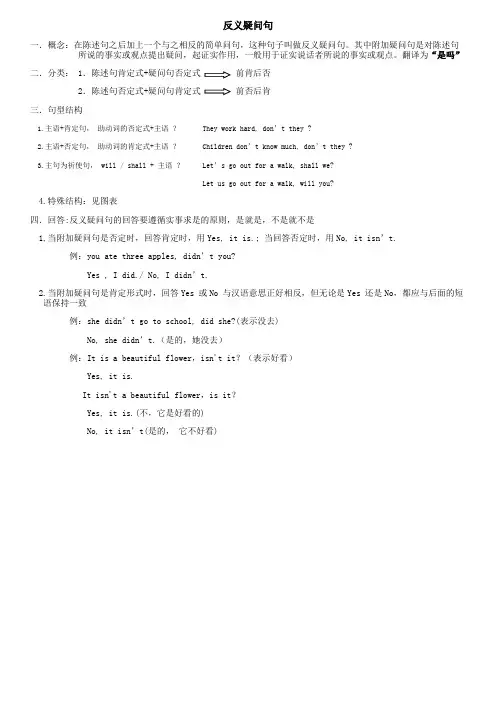
反义疑问句一.概念:在陈述句之后加上一个与之相反的简单问句,这种句子叫做反义疑问句。
其中附加疑问句是对陈述句所说的事实或观点提出疑问,起证实作用,一般用于证实说话者所说的事实或观点。
翻译为“是吗”二.分类: 1.陈述句肯定式+疑问句否定式前肯后否2.陈述句否定式+疑问句肯定式前否后肯三.句型结构1.主语+肯定句,助动词的否定式+主语?They work hard, don’t they ?2.主语+否定句,助动词的肯定式+主语? Children don’t know much, don’t they ?3.主句为祈使句, will / shall + 主语? Let’s go out for a walk, shall we?Let us go out for a walk, will you?4.特殊结构:见图表四.回答:反义疑问句的回答要遵循实事求是的原则,是就是,不是就不是1,当附加疑问句是否定时,回答肯定时,用Yes, it is.; 当回答否定时,用No, it isn’t.例:you ate three apples, didn’t you?Yes , I did./ No, I didn’t.2.当附加疑问句是肯定形式时,回答Yes 或No 与汉语意思正好相反,但无论是Yes 还是No,都应与后面的短语保持一致例:she didn’t go to school, did she?(表示没去)No, she didn’t.(是的,她没去)例:It is a beautiful flower,isn't it?(表示好看)Yes, it is.It isn't a beautiful flower,is it?Yes, it is.(不,它是好看的)No, it isn’t(是的,它不好看)。
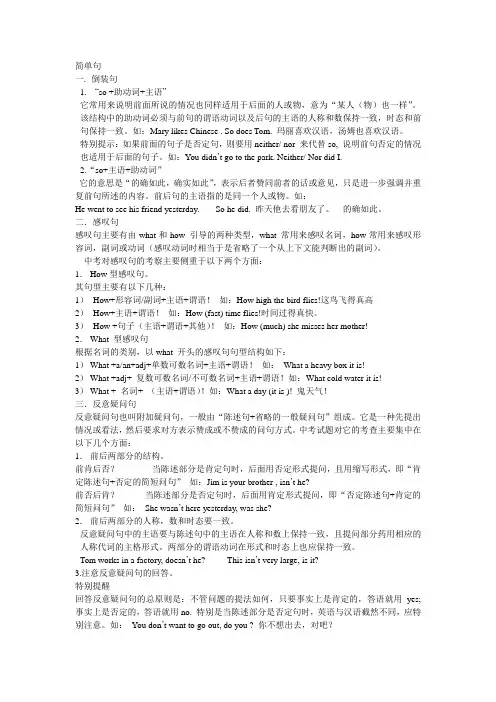
简单句一.倒装句1.“so +助动词+主语”它常用来说明前面所说的情况也同样适用于后面的人或物,意为“某人(物)也一样”。
该结构中的助动词必须与前句的谓语动词以及后句的主语的人称和数保持一致,时态和前句保持一致。
如:Mary likes Chinese . So does Tom. 玛丽喜欢汉语,汤姆也喜欢汉语。
特别提示:如果前面的句子是否定句,则要用neither/ nor 来代替so, 说明前句否定的情况也适用于后面的句子。
如:You didn’t go to the park. Neither/ Nor did I.2.“so+主语+助动词”它的意思是“的确如此,确实如此”,表示后者赞同前者的话或意见,只是进一步强调并重复前句所述的内容。
前后句的主语指的是同一个人或物。
如:He went to see his friend yesterday. ---- So he did. 昨天他去看朋友了。
的确如此。
二.感叹句感叹句主要有由what和how 引导的两种类型,what 常用来感叹名词,how常用来感叹形容词,副词或动词(感叹动词时相当于是省略了一个从上下文能判断出的副词)。
中考对感叹句的考察主要侧重于以下两个方面:1.How型感叹句。
其句型主要有以下几种:1)How+形容词/副词+主语+谓语!如:How high the bird flies!这鸟飞得真高2)How+主语+谓语!如:How (fast) time flies!时间过得真快。
3)How +句子(主语+谓语+其他)!如:How (much) she misses her mother!2.What 型感叹句根据名词的类别,以what 开头的感叹句句型结构如下:1)What +a/an+adj+单数可数名词+主语+谓语!如:What a heavy box it is!2)What +adj+ 复数可数名词/不可数名词+主语+谓语!如:What cold water it is!3)What + 名词+ (主语+谓语)!如:What a day (it is )! 鬼天气!三.反意疑问句反意疑问句也叫附加疑问句,一般由“陈述句+省略的一般疑问句”组成。
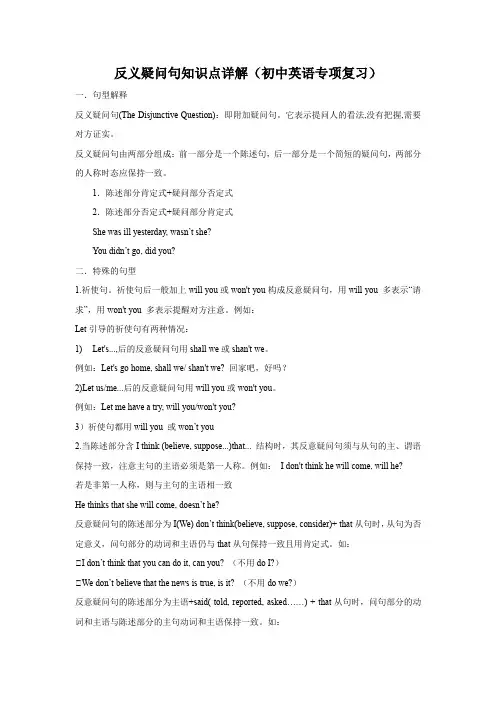
反义疑问句知识点详解(初中英语专项复习)一.句型解释反义疑问句(The Disjunctive Question):即附加疑问句。
它表示提问人的看法,没有把握,需要对方证实。
反义疑问句由两部分组成:前一部分是一个陈述句,后一部分是一个简短的疑问句,两部分的人称时态应保持一致。
1.陈述部分肯定式+疑问部分否定式2.陈述部分否定式+疑问部分肯定式She was ill yesterday, wasn’t she?You didn’t go, did you?二.特殊的句型1.祈使句。
祈使句后一般加上will you或won't you构成反意疑问句,用will you 多表示“请求”,用won't you 多表示提醒对方注意。
例如:Let引导的祈使句有两种情况:1)Let's...,后的反意疑问句用shall we或shan't we。
例如:Let's go home, shall we/ shan't we? 回家吧,好吗?2)Let us/me...后的反意疑问句用will you或won't you。
例如:Let me have a try, will you/won't you?3)祈使句都用will you 或won’t you2.当陈述部分含I think (believe, suppose...)that... 结构时,其反意疑问句须与从句的主、谓语保持一致,注意主句的主语必须是第一人称。
例如:I don't think he will come, will he?若是非第一人称,则与主句的主语相一致He thinks that she will come, doesn’t he?反意疑问句的陈述部分为I(We) don’t think(believe, suppose, consider)+ that从句时,从句为否定意义,问句部分的动词和主语仍与that从句保持一致且用肯定式。
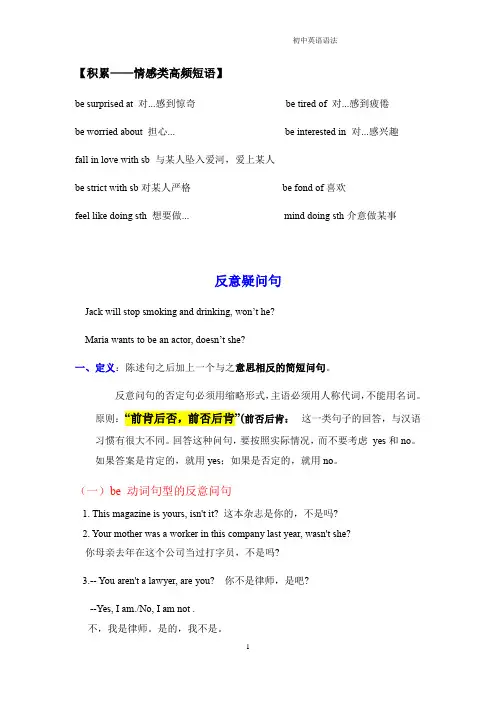
【积累——情感类高频短语】be surprised at 对...感到惊奇be tired of 对...感到疲倦be worried about 担心... be interested in 对...感兴趣fall in love with sb 与某人坠入爱河,爱上某人be strict with sb对某人严格be fond of喜欢feel like doing sth 想要做... mind doing sth介意做某事反意疑问句Jack will stop smoking and drinking, won’t he?Maria wants to be an actor, doesn’t she?一、定义:陈述句之后加上一个与之意思相反的简短问句。
反意问句的否定句必须用缩略形式,主语必须用人称代词,不能用名词。
原则:“前肯后否,前否后肯”(前否后肯:这一类句子的回答,与汉语习惯有很大不同。
回答这种问句,要按照实际情况,而不要考虑yes和no。
如果答案是肯定的,就用yes;如果是否定的,就用no。
(一)be 动词句型的反意问句1. This magazine is yours, isn't it? 这本杂志是你的,不是吗?2. Your mother was a worker in this company last year, wasn't she?你母亲去年在这个公司当过打字员,不是吗?3.-- You aren't a lawyer, are you? 你不是律师,是吧?--Yes, I am./No, I am not .不,我是律师。
是的,我不是。
4. --He isn’t sleeping, is he?(二)实意动词句型的反意问句1. -- She likes eating fish, doesn't she?她喜欢吃鱼,不是吗?--Yes, she does. /No, she doesn't.是的,她喜欢。
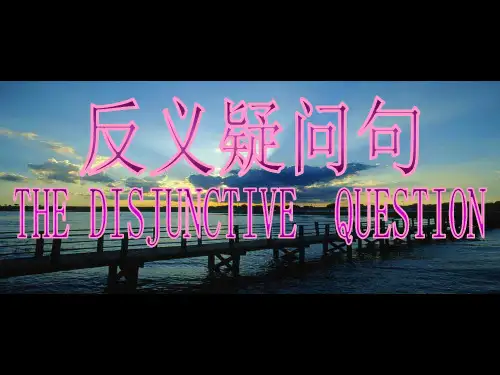

初中英语反义疑问句用法归纳-CAL-FENGHAI.-(YICAI)-Company One1反义疑问句一、反意疑问句要点简述反意疑问句又叫附加疑问句,是在陈述句后,对陈述句所叙述的事实提出的疑问。
其基本结构有两种:一是“肯定陈述句+简略否定问句”;二是“否定陈述句+简略肯定问句”。
反意疑问句后一部分的主谓与前一部分的主谓要保持人称、助动词及时态等方面的一致,即“三同一反”的原则。
这种疑问句的回答要根据事实,肯定的用“Yes, …”。
否定的用“No, …”。
如:It looks like rain, doesn’t it?He doesn’t need to work so late, does he?二、学习反意疑问句,特别要注意的问题1)陈述部分的主语是this, that时,疑问部分的主语多用it;陈述部分的主语是these, those时,疑问部分的主语多用they如:This is a dictionary, isn’t it?Those are shelves, aren’t they?2)陈述句如果是there be结构时,疑问句部分仍用there。
如: There once was a man named Saint Nicholas, wasn’t there?3)在英语口语中,“I am +表语结构”,后面的反意疑问句多用aren’t I来体现。
如: I am very interested in learning English, aren’t I?4)陈述句的主语是动词不定式,动词的-ing形式或从句时,疑问部分的主语多用it来体现。
如: Taking care of our environment is very important, isn’t it?What he said is right, isn’t it?5)陈述句中含有not, no, hardly, neither, never, few, little, too …to等否定词或具有否定意义的词时,疑问部分常用肯定形式。
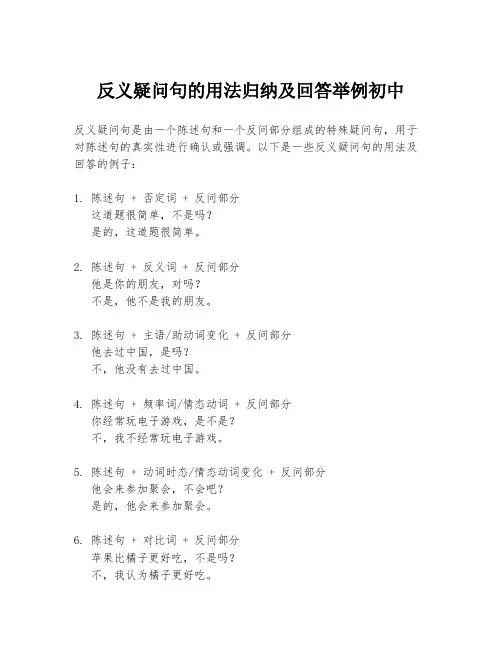
反义疑问句的用法归纳及回答举例初中
反义疑问句是由一个陈述句和一个反问部分组成的特殊疑问句,用于对陈述句的真实性进行确认或强调。
以下是一些反义疑问句的用法及回答的例子:
1. 陈述句 + 否定词 + 反问部分
这道题很简单,不是吗?
是的,这道题很简单。
2. 陈述句 + 反义词 + 反问部分
他是你的朋友,对吗?
不是,他不是我的朋友。
3. 陈述句 + 主语/助动词变化 + 反问部分
他去过中国,是吗?
不,他没有去过中国。
4. 陈述句 + 频率词/情态动词 + 反问部分
你经常玩电子游戏,是不是?
不,我不经常玩电子游戏。
5. 陈述句 + 动词时态/情态动词变化 + 反问部分
他会来参加聚会,不会吧?
是的,他会来参加聚会。
6. 陈述句 + 对比词 + 反问部分
苹果比橘子更好吃,不是吗?
不,我认为橘子更好吃。
7. 陈述句 + 看起来/听起来/似乎 + 反问部分
这部电影挺有趣的,不是吗?
是的,听起来很有趣。
请注意,以上例子仅供参考,具体的回答可能因为语境的不同而有所变化。
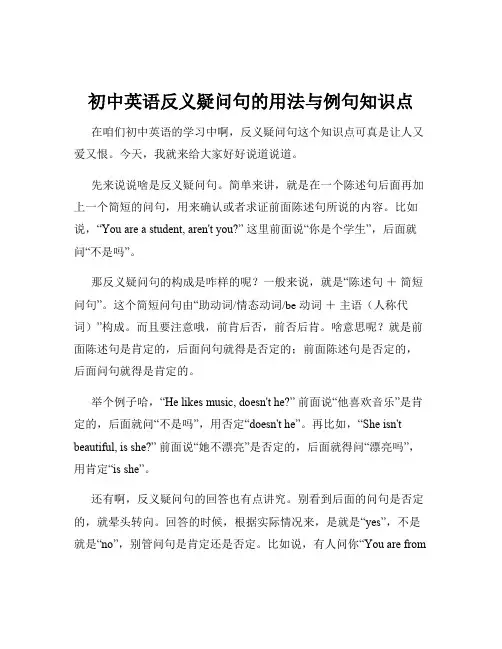
初中英语反义疑问句的用法与例句知识点在咱们初中英语的学习中啊,反义疑问句这个知识点可真是让人又爱又恨。
今天,我就来给大家好好说道说道。
先来说说啥是反义疑问句。
简单来讲,就是在一个陈述句后面再加上一个简短的问句,用来确认或者求证前面陈述句所说的内容。
比如说,“You are a student, aren't you?” 这里前面说“你是个学生”,后面就问“不是吗”。
那反义疑问句的构成是咋样的呢?一般来说,就是“陈述句+简短问句”。
这个简短问句由“助动词/情态动词/be 动词+主语(人称代词)”构成。
而且要注意哦,前肯后否,前否后肯。
啥意思呢?就是前面陈述句是肯定的,后面问句就得是否定的;前面陈述句是否定的,后面问句就得是肯定的。
举个例子哈,“He likes music, doesn't he?” 前面说“他喜欢音乐”是肯定的,后面就问“不是吗”,用否定“doesn't he”。
再比如,“She isn't beautiful, is she?” 前面说“她不漂亮”是否定的,后面就得问“漂亮吗”,用肯定“is she”。
还有啊,反义疑问句的回答也有点讲究。
别看到后面的问句是否定的,就晕头转向。
回答的时候,根据实际情况来,是就是“yes”,不是就是“no”,别管问句是肯定还是否定。
比如说,有人问你“You are fromChina, aren't you?” 如果你确实来自中国,那就回答“Yes, I am” 可别因为后面是“aren't you”就搞糊涂啦。
我还记得我上初中那会,有一次英语课上,老师正在讲反义疑问句。
当时老师举了个例子,“You have finished your homework, haven't you?”然后老师就点了我同桌起来回答。
我那同桌啊,平时英语就不太好,站起来一脸懵。
支支吾吾半天,最后来了一句:“I don't know” 全班同学都笑了,老师也哭笑不得,又给他耐心地解释了一遍。
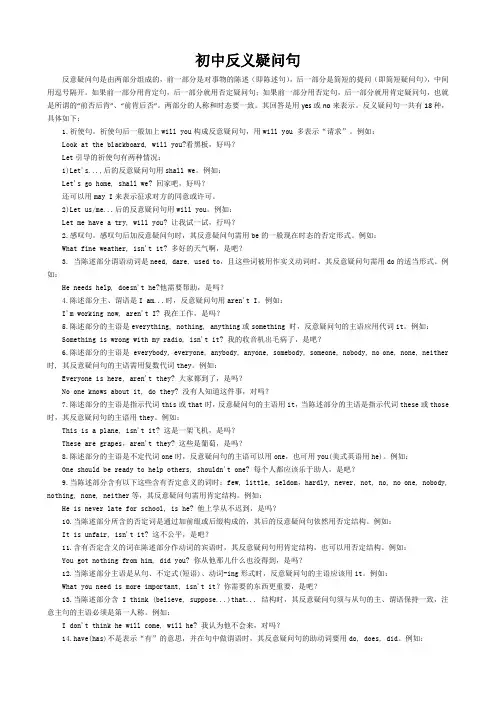
初中反义疑问句反意疑问句是由两部分组成的,前一部分是对事物的陈述(即陈述句),后一部分是简短的提问(即简短疑问句),中间用逗号隔开。
如果前一部分用肯定句,后一部分就用否定疑问句;如果前一部分用否定句,后一部分就用肯定疑问句,也就是所谓的“前否后肯”、“前肯后否”。
两部分的人称和时态要一致。
其回答是用yes或no来表示。
反义疑问句一共有18种,具体如下:1.祈使句。
祈使句后一般加上will you构成反意疑问句,用will you 多表示“请求”。
例如:Look at the blackboard, will you?看黑板,好吗?Let引导的祈使句有两种情况:1)Let's...,后的反意疑问句用shall we。
例如:Let's go home, shall we? 回家吧,好吗?还可以用may I来表示征求对方的同意或许可。
2)Let us/me...后的反意疑问句用will you。
例如:Let me have a try, will you? 让我试一试,行吗?2.感叹句。
感叹句后加反意疑问句时,其反意疑问句需用be的一般现在时态的否定形式。
例如:What fine weather, isn't it? 多好的天气啊,是吧?3. 当陈述部分谓语动词是need, dare, used to,且这些词被用作实义动词时,其反意疑问句需用do的适当形式。
例如:He needs help, doesn't he?他需要帮助,是吗?4.陈述部分主、谓语是I am...时,反意疑问句用aren't I。
例如:I'm working now, aren't I? 我在工作,是吗?5.陈述部分的主语是everything, nothing, anything或something 时,反意疑问句的主语应用代词it。
例如:Something is wrong with my radio, isn't it? 我的收音机出毛病了,是吧?6.陈述部分的主语是 everybody, everyone, anybody, anyone, somebody, someone, nobody, no one, none, neither 时, 其反意疑问句的主语需用复数代词they。
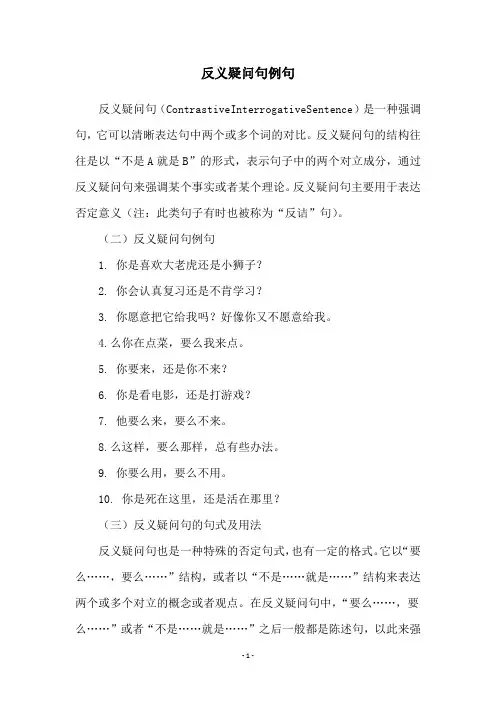
反义疑问句例句反义疑问句(ContrastiveInterrogativeSentence)是一种强调句,它可以清晰表达句中两个或多个词的对比。
反义疑问句的结构往往是以“不是A就是B”的形式,表示句子中的两个对立成分,通过反义疑问句来强调某个事实或者某个理论。
反义疑问句主要用于表达否定意义(注:此类句子有时也被称为“反诘”句)。
(二)反义疑问句例句1. 你是喜欢大老虎还是小狮子?2. 你会认真复习还是不肯学习?3. 你愿意把它给我吗?好像你又不愿意给我。
4.么你在点菜,要么我来点。
5. 你要来,还是你不来?6. 你是看电影,还是打游戏?7. 他要么来,要么不来。
8.么这样,要么那样,总有些办法。
9. 你要么用,要么不用。
10. 你是死在这里,还是活在那里?(三)反义疑问句的句式及用法反义疑问句也是一种特殊的否定句式,也有一定的格式。
它以“要么……,要么……”结构,或者以“不是……就是……”结构来表达两个或多个对立的概念或者观点。
在反义疑问句中,“要么……,要么……”或者“不是……就是……”之后一般都是陈述句,以此来强调句子的主谓宾。
反义疑问句有很多用途,例如可以用它来表达句子中的对立性,以强调表达的意思;也可以通过反义疑问句来询问对方的想法。
如果把反义疑问句用在口头对话中,则有助于激发对方的回答热情。
在文章中,我们也可以使用反义疑问句来加强论证或讽刺效果,从而表达出作者的想法和感受。
(四)反义疑问句的细节探究反义疑问句可以分为三大类:宾语结构、主语结构及其它。
1.宾语结构的反义疑问句宾语反义疑问句是指句子结构中以宾语引出的反义疑问句。
这种句式的特点是,宾语反义疑问句是以宾语引出的反义疑问句,宾语位于句首或句子倒装部分,而宾语之后跟随着“要么……,要么……”或“不是……就是……”的句子结构,其中用来对照的词必须遵循宾语的性和数。
例子:a. 你爱吃苹果还是香蕉?b. 你是来看电影,还是去吃饭?2.主语结构的反义疑问句主语结构的反义疑问句是以主语引出的反义疑问句。
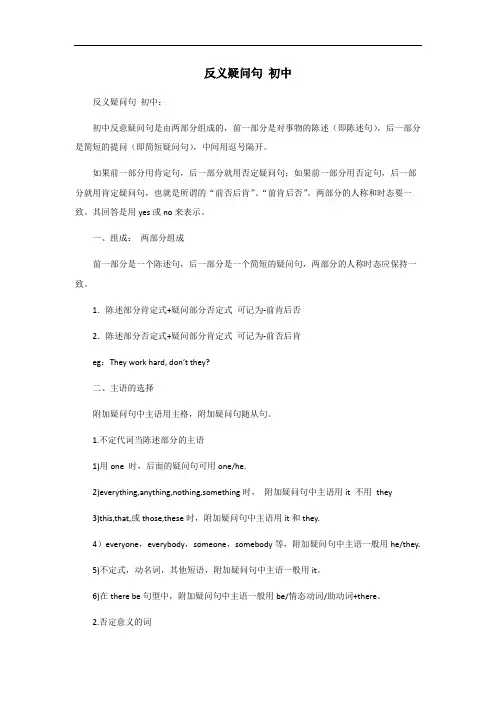
反义疑问句初中反义疑问句初中:初中反意疑问句是由两部分组成的,前一部分是对事物的陈述(即陈述句),后一部分是简短的提问(即简短疑问句),中间用逗号隔开。
如果前一部分用肯定句,后一部分就用否定疑问句;如果前一部分用否定句,后一部分就用肯定疑问句,也就是所谓的“前否后肯”、“前肯后否”。
两部分的人称和时态要一致。
其回答是用yes或no来表示。
一、组成:两部分组成前一部分是一个陈述句,后一部分是一个简短的疑问句,两部分的人称时态应保持一致。
1.陈述部分肯定式+疑问部分否定式可记为-前肯后否2.陈述部分否定式+疑问部分肯定式可记为-前否后肯eg:They work hard, don’t they?二、主语的选择附加疑问句中主语用主格,附加疑问句随从句。
1.不定代词当陈述部分的主语1)用one 时,后面的疑问句可用one/he.2)everything,anything,nothing,something时,附加疑问句中主语用it 不用they3)this,that,或those,these时,附加疑问句中主语用it和they.4)everyone,everybody,someone,somebody等,附加疑问句中主语一般用he/they.5)不定式,动名词,其他短语,附加疑问句中主语一般用it。
6)在there be句型中,附加疑问句中主语一般用be/情态动词/助动词+there。
2.否定意义的词1)当陈述部分有never,seldom, hardly,few,little,barely, scarcely, nothing 等否定意义的词时,后面的反意疑问句则为肯定形式:eg:There are few apples in the basket, are there?eg:He can hardly swim, can he?eg:They seldom come late, do they?2)当陈述部分含有否定意思的词是unhappy,dislike,unfriendly等含有否定词缀的派生词,也就是有un-前缀、-less后缀等含有词缀而意思否定的词,当做肯定句处理,疑问部分要用否定形式。
初一反义疑问句【反义疑问句】〔一〕概念: 反意疑问句是由陈述句和附在其后的附加疑问句组成。
其中附加疑问句是对陈述句所说的事实或观点提出疑问, 起证实作用, 一般用于证实说话者所说的事实或观点。
〔二〕要点注意:1.反意疑问句前后两局部谓语应是: “肯定陈述+否认疑问〞或“否认陈述+肯定疑问〞。
2.简单问句如果是否认式: not应与be, do, will等系动词、助动词、情态动词缩写。
3.简单问句的主语不用名词, 应用人称代词。
4、陈述局部含“too...to〞时, 是否认句。
〔三〕用法:1) 陈述局部I am时, 疑问局部要用aren't I.I'm as tall as your sister, aren't I" 〔我和你姐姐一样高, 对吗?〕2) 陈述局部用no, nothing, nobody, never, few, little, seldom, hardly等否认含义的词时, 疑问局部用肯定含义。
如:The old man made no answer, did he"Jim is never late for school, is he"3) 陈述局部有情态动词have to +v.(had to + v.), 疑问局部常用don't +主语〔didn't +主语〕。
We have to get there at eight tomorrow, don't we"used to, 疑问局部用didn't +主语或usedn't +主语。
He used to take pictures there, didn't he" / usedn't he"had better〔最好〕+ v.疑问句局部用hadn't you"You'd better read it by yourself, hadn't you"4) 陈述局部有would rather〔宁可、宁愿〕+v., 疑问局部多用wouldn't +主语。
反义疑问句一、祈使句的反义疑问句1、肯定祈使句Will you?/won’t you?2、否定祈使句Will you?3、Let的祈使句Let us ...,will you?(此处Let us 表示“允许我们...”)Let’s...,shall we? (此处Let’s表示“让我们...吧”)Let + 第三人称...,will you?二、Must的反义疑问句1、表示“必须” musn’t /needn’tEg. You must go now, needn’t you?2、表示“不准”Eg. You musn’t smoke here, must/may you?3、表示推测,肯定。
(I’m sure + 从句)Eg. You must be hungry now, aren’t you?I’m sure you are hungry now, aren’t you?She must have heard about that, hasn’t she?I’m sure you have heard about that, haven’t you?You must have watched that movie last night, didn’t you?(last nigh 为具体时间点,所以用一般过去式)三、主语(反义疑问句)+从句主句:I(don’t)think/believe/consider/suppose 或 I’m afraid/sure...后跟从句时,可将从句部分进行反义疑问Eg. I don’t think he will win, will he?I think he will win, won’t he?She thinks he will win, doesn’t she?(当主句主语不是I时不适用于该用法,此句中的翻译疑问针对的是主句而非从句)四、当句中包含有表示否定意义的副词或不定代词时,反义疑问句用肯定形式Eg. Nothing happened to him, did it?It is unfair, isn’t it?He dislikes watching TV, doesn’t he?(该句中含否定意义的是动词而非副词或不定代词,因此不适用于该用法,反义疑问句仍然使用否定形式)五、反义疑问句的回答反义疑问句的回答针对被提问部分的谓语动词,且与回答句前部分的Yes和No 保持一致Eg. A: You haven’t lost the ticket, have you?B: D I know it’s hard to get another one at this moment.A. Yes, I haven’tB. No, I haveC. I hope soD. I’m afraid not六、陈述部分的主语与反义疑问句主语保持一致的情况1、OneEg. One can’t be too careful when driving a car, can one/he?一个人在开车的时候再怎么小心也不为过。
初中反义疑问句详解及练习和答案反义疑问句是一种附加疑问句,用于征询对方的意见,表示提问人的看法没有把握,需要对方证实。
反义疑问句由两部分组成,前一部分是陈述句,后一部分是简短的疑问句,两部分的人称时态应保持一致。
常见的反义疑问句有以下几种形式:1.肯定陈述部分 + 否定疑问部分,如:They work hard。
don’t they?2.否定陈述部分 + 肯定疑问部分,如:You didn’t go。
did you?需要注意的是,当陈述部分的主语是I时,附加疑问句中的主语应该用you,如:I find English very interesting。
don’t you。
当陈述部分的主语是合成代词时,附加疑问句中的主语通常用they,但也可以用he,尤其是nobody。
no one等作主语具有否定概念时。
当陈述部分的主语是不定代词时,附加疑问句中的主语一般用it,不用they。
当陈述部分的主语是指示代词时,附加疑问句中的主语分别用it和they。
5.在正式场合,如果陈述部分以代词one作主语,附加疑问句中的主语也应该用one。
在非正式场合,可以用you或he 代替。
例如:One should always be careful。
shouldn’t one。
或者 can you?One must fulfill his duty。
mustn’t he?6.如果陈述部分用I’m…结构,附加疑问部分一般用aren’t I。
例如:I am feeling good today。
aren’t I?7.当陈述句为there be结构时,附加疑问句中的主语也应该用there。
例如:There’s no way to f ix it。
is there?There’s something strange here。
XXX?8.当陈述部分带有seldom。
hardly。
never。
rarely。
few。
little。
反义疑问句的用法归纳及回答举例初中
摘要:
一、反义疑问句的用法归纳
1.反义疑问句的构成
2.反义疑问句的回答方式
3.反义疑问句的注意事项
二、反义疑问句的回答举例
1.肯定回答举例
2.否定回答举例
正文:
一、反义疑问句的用法归纳
1.反义疑问句的构成
反义疑问句通常由两部分组成:一个陈述句和一个简短的疑问句。
陈述句和疑问句之间通常有一个逗号分隔,而且疑问句部分常常以“难道不是吗?”等反问语气词结尾。
例如:“你不喜欢吃苹果,难道不是吗?”
2.反义疑问句的回答方式
当反义疑问句用于询问对方意见时,回答时要根据事实情况给出肯定或否定的回答。
如果事实情况与陈述句一致,回答为肯定;如果事实情况与陈述句相反,回答为否定。
例如,对于“你不喜欢吃苹果,难道不是吗?”这个问题,如果对方确实不喜欢吃苹果,回答应该是“是的,我不喜欢。
”
3.反义疑问句的注意事项
在使用反义疑问句时,要注意陈述句和疑问句的一致性。
如果陈述句是肯定形式,疑问句部分也应该是肯定形式;如果陈述句是否定形式,疑问句部分也应该是否定形式。
此外,反义疑问句通常用于表示对某事不确定或想要得到对方确认的情况下,所以要根据实际情况适当使用。
二、反义疑问句的回答举例
1.肯定回答举例
张三问:“你不喜欢吃苹果,难道不是吗?”
李四回答:“是的,我不喜欢。
”
2.否定回答举例
张三问:“你不喜欢吃苹果,难道不是吗?”
李四回答:“不,我喜欢吃苹果。
反义疑问句一)基本内容1. 反义疑问句的结构:陈述句+ 简短的一般疑问句(或简称附加问句)2. 附加问句部分如由“助动词、系动词、情态动词+主格代词”构成,只能是两个词(若有否定词not,应将not缩写)3. 附加问句部分的第二个词一般都是主格代词。
4. 在反义疑问句的前后两个部分中,一般都有一处用否定形式,如果前面的陈述句时否定句,后面的附加问句用肯定;反之,前肯,后否。
Lily speaks good English, doesn’t she?John can’t come here t oday, can he?She is from Japan,isn’t she?二)一些需要特别注意的反义疑问句1. 陈述句部分是”there be”句型是,其附加问句部分为be there.There is something wrong with the computer, isn’t there?There is some milk in the bottle, _______________?There are many people in the park on Sunday, ____________?There isn't any milk left,___________?2. 陈述句部分带有表示否定意义的词,如:few, little, hardly, seldom, never,scarcely,rarely,nowhere,nothing,no one,nobody,none等时,附加问句用肯定形式。
注意,若陈述句部分表示否定意义的词是impolite, unfair, unhappy,disagree,dislike等带否定前缀的词时,该陈述句不算是否定句,附加问句部分仍然要用否定式。
The students were impolite,weren’t they?He has few good friends, has he?Some plants never blown (开花), do they?You never read this novel, ______________?Few people can live to 150,______________?3. 陈述句部分的主语是everyone,everybody,someone,nobody,no one,none,anyone,somebody等不定代词时,附加问句的主要通常用he,也可以用they。
12.初中语法(十二)简单句(陈述句、疑问句、反意疑问句、感叹句、祈使句、倒装句).pptx初中语法(十二)简单句(陈述句、疑问句、反意疑问句、感叹句、祈使句、倒装句)初中语法(十二)简单句(陈述句、疑问句、反意疑问句、感叹句、祈使句、倒装句)语法互动(十二)┃简单句(陈述句、疑问句、反意疑问句、感叹句、祈使句、倒装句)中考考点1.陈述句的概念及其肯定形式和否定形式。
2.一般疑问句、特殊疑问句、选择疑问句、反意疑问句的结构及答语。
3.由what和how引导的感叹句。
4.倒装句的基本用法。
初中语法(十二)简单句(陈述句、疑问句、反意疑问句、感叹句、祈使句、倒装句)语法互动(十二)┃简单句(陈述句、疑问句、反意疑问句、感叹句、祈使句、倒装句)考点一陈述句陈述句是用于陈述一个事实或表达说话人的看法的句子。
陈述句主要分为肯定句和否定句。
1.陈述句的肯定句式主要有五种基本句型(1)“主语+系动词+表语”Iamhonored.我很荣幸。
(2)“主语+不及物动词”Thestudentsworkveryhard.学生们学习很努力。
(3)“主语+及物动词+宾语”IteachEnglish.我教英语。
初中语法(十二)简单句(陈述句、疑问句、反意疑问句、感叹句、祈使句、倒装句)语法互动(十二)┃简单句(陈述句、疑问句、反意疑问句、感叹句、祈使句、倒装句)(4)“主语+及物动词+间接宾语+直接宾语”,间接宾语是人,直接宾语是物。
能接双宾语的动词多数要在间接宾语前加to或for。
①加to的动词有give,send,pass,take,bring,show,lend,sell等。
Shesentmeapresent.=Shesentapresenttome.她寄给了我一份礼物。
②加for的动词有buy,make,build,mend,cook等。
Myfatherboughtmeabike.=Myfatherboughtabikeforme.我爸爸给我买了一辆自行车。
简单句1.I found_________hard __________ the work in such a short time.A. that; to finishB. it was; to finishC. it; finishingD. this; finishing2._____ everybody likes watching TV in my family. My parents like doing outdoor activities.A.NoB.NotC.NoneD.Nobody3.Li Na is famous all the tennis fans in China know her.A. too; toB. enough; toC. as; asD. so; that4.It’s so hot today. How about?A、swimmingB、to play tennisC、go to the beach5.—?—They are reading books.A、What do they doB、What did they doC、What are they doing6.--____ is your pen?-- It’s_____.A. What; blueB. What color; blueC. What; blue colorD. What color; blue color7.-Why are you in such a hurry, Mike?-There_______ an NBA basketball game in ten minutes.A. will beB. will haveC. is going to haveD. are going to be8.I’m afraid there_____ a heavy rain this afternoon.A. will isB. willC. will haveD. will be9.is a great thing to help people in need.A.ThatB. ItC. ThisD. Which10.What’s the matter _____ you?A. withB. onC. in11.You don't know the way. Why ______ the policeman for help?A. don't askB. no askC. not askD. not to ask12.—Do you want to go to Sanya or Qingdao for holiday?—________A. I want to go to Sanya. B. Yes, I do.C. No,Idon’t.D. Good idea!13.Zhao Lin _____ like to go to the zoo.A. isn’t B.is C. doesn’t D. don’t14.----Sandy, it’s really grateful for your help with my physics.----My pleasure. ____________.A. Many hands make light workB. It was better to be safe than sorryC. The early bird catches the wormD. That’s what friends are for15.--____ do you read English newspaper?--I read China Daily every day.A. How soonB. How longC. How often16.Just as the saying goes, “_______” My cousin has made his dream come true after years of hard work.A. Practice makes perfectB. No pains, no gainsC. Every dog has its dayD. Actions speak louder than words17.There a sports meeting next week.A、is going to haveB、is going to beC、will have18.—Look! Lily and Sally are cleaning the school laboratory.—Let’s go and join them..A. Many hands make light workB. The early bird catches the wormC. A friend in need is a friend indeedD. The grass is always greener on the other side19.This story is too difficult for us. _____ read something easier.A.Why notB.Why not toC.Why not youD.Why don’t20.--- I can’t believe you finished the work so quickly.--- That’s because several classmates helped me . No wonder they say _______ .A. each dog has its dayB. early bird catches the wormC. too many cooks spoil the brothD. many hands make light work21.There ________ a big tree and many flowers in front of my house now.A. isB. areC. wasD. Were22.—Would you mind my___________ here?—___________. We can’t stand it!A. smoke, OK.B. smoking, Certainly not.C. smoking, Of course.D. smoking, You’d better not.23.________give him a ticket to a ball game?A.Why not youB.Why don’t youC. Why not to24.—You look rather tired. _______stop to take a rest?—All right. But I’ll have to work for a few more minutes.A. Why notB. Why don’tC. What aboutD. How about25.---I don’t know where to find something about the rainforest.---Why ______on the Internet? There is a lot of information about it. A.don’t go B.not to goC.not goingD.not go反义疑问句1. It’s the third time that John has been late, ____?A.hasn’t heB. isn’t heC. isn’t itD. hasn’t it2. Let’s take a rest, ___________.A. will weB. shall weC. s han’t weD. won’t we3. Let us pass, _________?A. shan’t weB. shall weC. won’t weD. will you4. Wait a minute, __________?A. shall youB. will youC. do youD. don’t you5.The suit’s finished, __________?A. doesn’t itB. isn’t itC. haven’t youD. hasn’t it6. He’s posted the letter, _________he?A. isn’tB. doesn’tC. hasn’tD. wasn’t7. They’d go with us, __________?A. wouldn’t theyB. didn’t theyC. hadn’t theyD. couldn’t they8. What fresh air, ________?A. is itB. does itC. isn’t itD. doesn’t it9. The Emperor’s clothes became the talk of the whole city, _________?A. did itB. didn’t itC. did theyD. didn’t they10. Mr. And Mrs. Turner work in this hospital, ________?A. are theyB. aren’t theyC. do theyD. don’t they11. She has breakfast at six every day, ________?A. has sheB. hasn’t sheC. does sheD. doesn’t she12. Nothing seems to please her, _________?A. does itB. doesn’t itC. is itD. isn’t it13. She never tells a lie, ________?A. does sheB. doesn’t sheC. is itD. isn’t it14. You hardly know each other, _________?A. do youB. don’t youC. have youD. didn’t you15. The man in blue must be your brother, _____?A. mustn’t heB. needn’t heC. isn’t heD. is he16.I don’t think he will come to our party, _____?A. will heB. won’t heC. does heD. do I17. I suppose he’s serious, ___________?A. do IB. don’t IC. is heD. isn’t he18. Wang said that he was not there then, _____?A. did heB. didn’t heC. was heD. wasn’t he19. You daren’t say that to him, _________?A. dare youB. do youC. daren’t youD. don’t you20. You must have read about Dickens long ago, __________?A. mustn’t youB. haven’t youC. can’t youD. didn’t you21. You’d better not smoke here, ________?A. will youB. shall youC. have youD. had you22. There isn’t going to be a volleyball match next week, __________?A. is itB. isn’t itC. is thereD. isn’t there23. There used to be a church behind the cemetery, _____________?A. didn’t thereB. used thereC. usedn’t itD. didn’t it24. What a lovely day, _________?A. doesn’t itB. hasn’t itC. won’tD. isn’t it25. You must have been there, ____________?A. have youB. did youC. haven’t youD. didn’t you26. That is your school, ___________?A. isn’t thatB. mustn’t itC. isn’t itD. won’t it27. She dislikes this skirt, _________________?A. doesn’t sheB. does sheC. isn’t sheD. is she28. No one can stop us from going there, ______?A. can’t itB. can theyC. can’t theyD. can one29.--- Where is your father? --- Oh, __________ .A.here comes he B.here does he come C.he here comes D.here he comes 30.Look, _________ .A.here the bus comes B.here is the bus comingC.here comes the bus D.here the bus is coming1~20:CBDBB CACDD DAAAC ADBAD 21~30:DCADC CABDC。